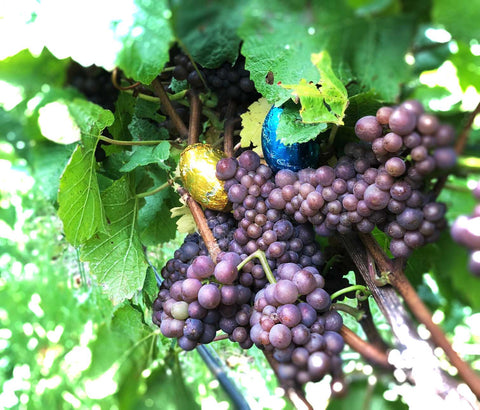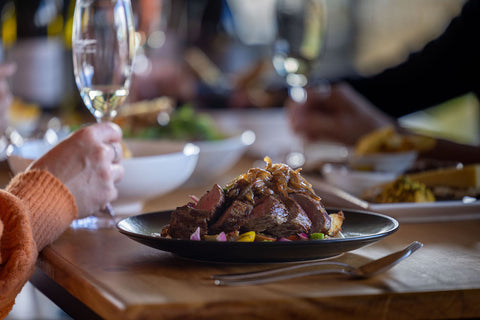Our 2023 vintage Captain Spotswood Pinot Noir is now available, and it truly stands out. If you’re a fan of The Captain, or Tasmanian Pinot Noir in general, you’ll want to add a few bottles of this to your cellar.
The cool, extended 2023 season has enhanced our Spotswood Pinot with the typical bright fruitiness, complemented by delightful earthy savouriness in this vintage.
Aromas of raspberry and red cherry pave the way to a delightfully savory palate featuring red cherry, cherry pip, and spice. Delicious on its own, this wine also pairs perfectly with food. The beautifully balanced fruit, oak, and acidity make it an ideal companion for hearty winter dishes. Try it with lamb ragu, roast beef, or chargrilled vegetables.
This wine is drinking beautifully now, but can also be cellared carefully for 5 to 10 years.
Watch this episode of Just a Minute with Greg to learn more about our 2023 Captain Spotswood Pinot Noir.
The Story Behind the Label
Captain John Spotswood, a retired army officer, was the first settler to be granted land at what was to become Bangor, including the land where Bangor's vineyard now stands. Early accounts record that he rather enjoyed a drink, and we expect he would have fancied a glass of our Pinot Noir, bearing his name.
Captain John Spotswood (b. 1775 in Ireland, d. 1859 in Hobart) was the first settler to be granted land on property that would later become part of Bangor. As a retired soldier, he was granted 2650 acres in 1831, where he farmed a range of crops.
During a tour of Tasmania's east coast in January 1838, Lady Jane Franklin (the wife the Governor of Van Diemens Land) visited Captain Spotswood and remarked on his house, farm, and his drinking habits! An extract from her journal reads as follows:
"After breakfasting early on Wednesday morning the 3rd we took to the boats and passed from them into the cart which was standing in the water with four bullocks yoked to it, a convenience we owed to Captain Spotswood, a settler on E. Bay , who was awaiting us with Captain Harbury of the Eliza. On the shore Captain Spotswood’s countenance and manner indicated in its heaviness and melancholy the correctness of the character which had been given me of the individual, viz., that he has occasional fits of drunkenness which palsy all his faculties. I was told that he will go on temperately an soberly for a length of time, and then at the first temptation arising from a visit to town he will give himself up to course of prolonged and brutalizing intoxication. Captain Spotswood is a middle-aged man, a widower with 2 daughters."
"He was a captain in the 84th regt. Which he was obliged to quit in consequence of his irregular habits. He got a maximum grant shortly before on Forestier’s Peninsula of 2560 acres, which he sold immediately to Dr. Finlay [Imlay] for 2500 guineas. This information I had from Captain Booth. [Port Arthur Commandant] Captain S. Informed me himself that he had lived 7 years on the Neck, and that his estate which he calls Callaba [Colaba] from a place near Bombay consisted of 400 acres, 50 of which are in cultivation, his crops being wheat, turnips, potatoes, peas, etc. He said it was only third rate land. The distance across the Neck is 600 yards. In crossing this distance in the bullock cart we passed the farm of Captain S. The dwelling house which we declined entering is built of wood. But seems a respectable building having a deep sloping roof. The property commands a double view towards Norfolk Bay on the S. & E. Bay bounded by Maria Island on the North."
The area known as Colaba includes the current site of the vineyard and a number of surrounding paddocks. Captain Spotswood's cottage stood opposite Bangor's vineyard until January 2013 when it was sadly lost in the large bushfire that destroyed much of Dunalley and surrounding areas, and covered 2,000 hectares of Bangor. The cottage, and what it represented, held a special place in the heart of Elizabeth Dunbabin and her family.

Captain Spotswood's Cottage
We have been fortunate enough to be able to honour the memory of Captain Spotswood through this wine label, and also through the convict bricks from his chimneys that we were able to salvage after the fire and re-lay as a beautiful hearth in Bangor Shed. Come and enjoy a glass of wine with us by the fire and admire this piece of Tasmanian history.



